Blog
January 03, 2025 By Adam Grover
Strategies for Hispanic Transcription in Ministry Broadcasts

Strategies for Hispanic Transcription in Ministry Broadcasts To foster a sense of connection and inclusivity in ministry broadcasts, engaging the Hispanic audience is of utmost importance. In this article, we will explore key strategies for Hispanic transcription in ministry broadcasts, focusing on techniques that enhance understanding, accessibility, and engagement within...
CONTINUE READINGDecember 18, 2024 By Cal Gallagher
The Ongoing Evolution of Social Media Captioning

With social media's dynamic nature, captioning services are continuously adapting, becoming not just a tool for accessibility but a major player in viewer engagement, global content reach, and overcoming the 'sound off' dilemma. Here's how the landscape is changing: The Multifaceted Role of Captions on Social Platforms Boosting Engagement: Videos...
CONTINUE READINGDecember 16, 2024 By Cal Gallagher
The Rise of Streaming Services and Captioning Challenges

The landscape of entertainment has been transformed by the ascent of streaming services. Platforms like Netflix, Hulu, and Disney+ now dominate how we access content. This shift towards digital consumption has brought forth new challenges, particularly in the realm of closed captioning. This post delves into the captioning obstacles faced...
CONTINUE READINGDecember 10, 2024 By Cal Gallagher
Accessibility Standards in 2025: The Essential Role of Human Captioning

As we advance into 2025, the focus on accessibility for digital content has intensified, driven by updates to the Americans with Disabilities Act (ADA) and emerging state regulations. Closed caption services, especially those provided by experienced captioning companies like CaptionLabs, play a pivotal role in meeting these evolving standards. Current...
CONTINUE READINGDecember 05, 2024 By Cal Gallagher
The Impact of AI on Closed Captioning: Why Human Expertise Matters

As the demand for accessible content continues to rise, artificial intelligence (AI) has made significant inroads in closed caption services. From automated transcription to real-time captions, AI is reshaping the captioning landscape. While AI may seem like a cost-effective solution, it’s essential to understand its limitations and why relying solely...
CONTINUE READINGMarch 22, 2023 By Adam Grover
Pop-On vs. Roll-Up Captions: Which One Should Your Ministry Use?

Pop-On vs. Roll-Up Captions: Which One Should Your Ministry Use? As a ministry, it's essential to make your content accessible to all members of your audience, including those who are deaf or hard of hearing. One way to do this is by adding captions to your videos or audio recordings....
CONTINUE READINGMay 24, 2023 By Jake Drown
How to Approach Translating Sensitive Language for Subtitles

How to Approach Translating Sensitive Language for Subtitles Translating subtitles for sensitive language can be tricky, as it requires balancing cultural nuances, accuracy, and sensitivity. It's important to keep in mind the context and audience of the content being translated, as well as any potential cultural differences that may impact...
CONTINUE READINGMay 23, 2023 By Jake Drown
7 Common Issues with Voice Dubbing Services
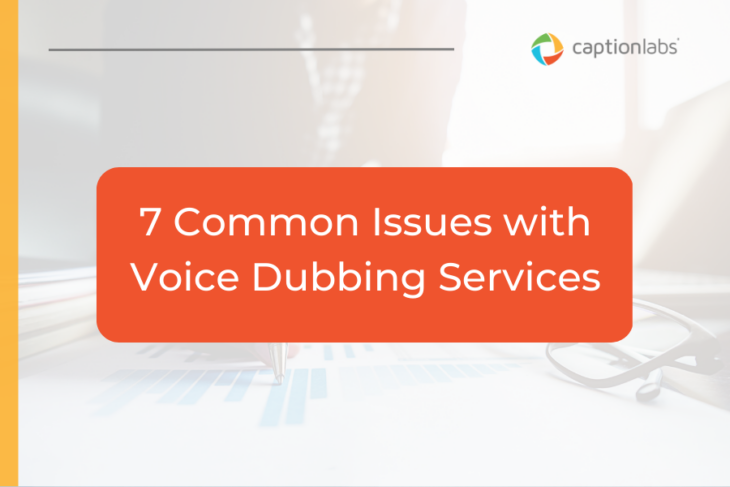
7 Common Issues with Voice Dubbing Services Voice dubbing is a process that involves replacing the original audio track of a video or movie with a new one in a different language. This process can be challenging, as it requires a lot of coordination and resources to ensure that the...
CONTINUE READINGMay 22, 2023 By Jake Drown
Understanding Comma Confusion in Closed Captioning
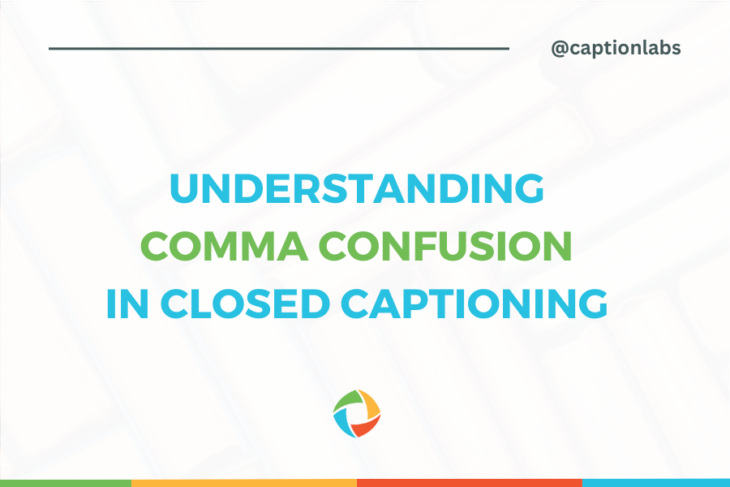
Understanding Comma Confusion in Closed Captioning Comma confusion is a common problem in the English language that can have significant implications, especially for closed captioning. Many people do not fully understand the proper usage of commas, which can lead to incorrect punctuation in captions. In this blog post, we will...
CONTINUE READINGMay 19, 2023 By Jake Drown
The Importance of Homophones in Closed Captions
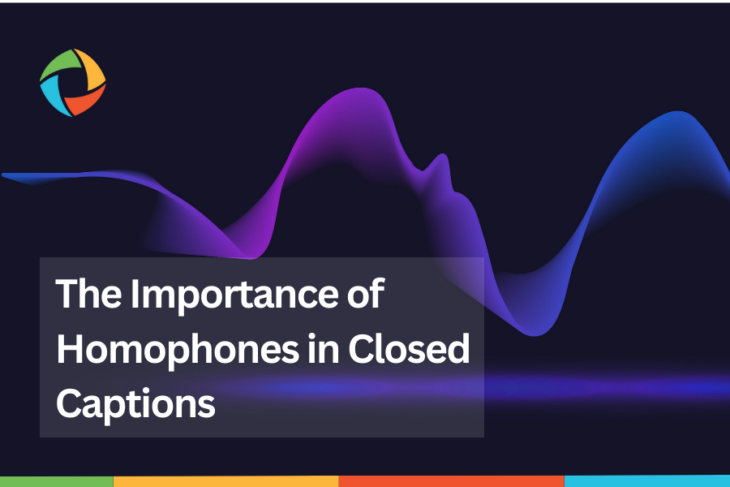
If you're familiar with closed captions, you may have noticed that they occasionally feature errors, particularly when it comes to homophones. Homophones are words that sound the same but are spelled differently and have different meanings. Inaccurate use of homophones in closed captions can lead to confusion for viewers and...
CONTINUE READINGMay 15, 2023 By Jake Drown
The Psychology of Closed Captioning: Increasing Viewer Engagement

The Psychology of Closed Captioning: Increasing Viewer Engagement Have you ever watched a video with closed captions and found yourself more engaged and better able to comprehend the content? You're not alone. Closed captioning can have a powerful impact on viewer engagement and retention, and understanding the psychology behind it...
CONTINUE READINGApril 19, 2023 By Jake Drown
The Battle of Automated Captions: Facebook vs YouTube
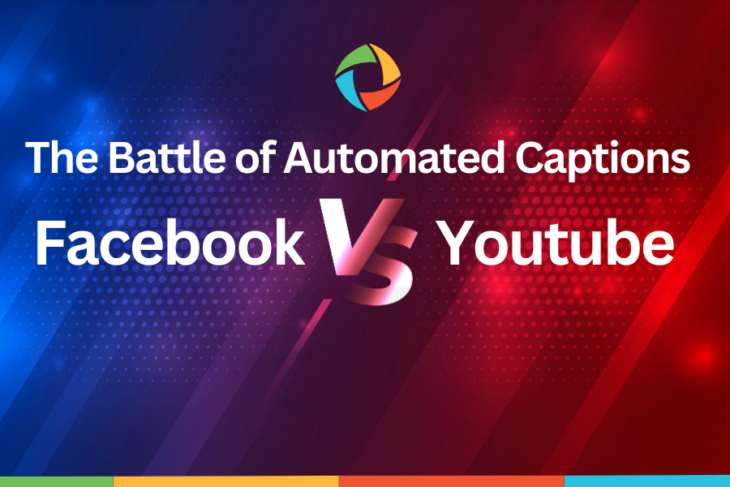
The Battle of Automated Captions: Facebook vs YouTube Are you tired of inaccurate captions on your social media videos? You're not alone! With more and more people using social media to share videos, it's essential to ensure that captions are accurate and accessible to everyone. In this blog post, we'll...
CONTINUE READINGApril 17, 2023 By Jake Drown
Why You Should Always Include Closed Captions in Videos
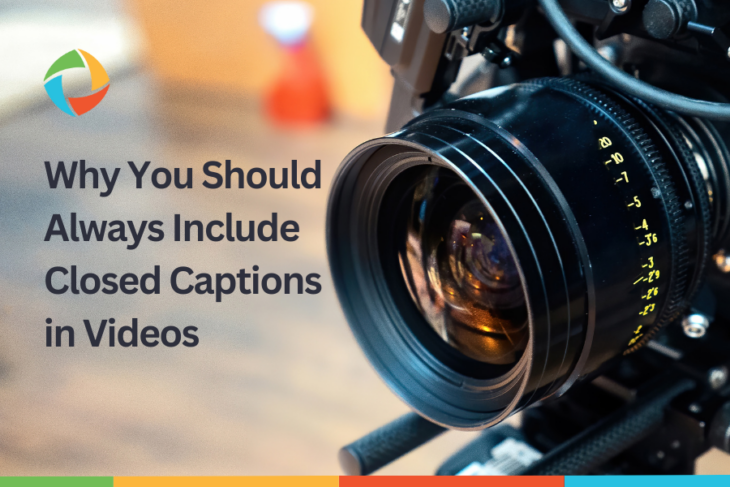
Why You Should Always Include Closed Captions in Videos Closed captions are an important tool to help ensure that everyone can access your video content, regardless of hearing ability. In this guide, you'll learn why having closed captions is valuable and how to include them in your videos. Closed Captions...
CONTINUE READINGApril 12, 2023 By Jake Drown
Why You Should Invest in a Professional Closed Captioning Company for Your Facebook and YouTube Videos
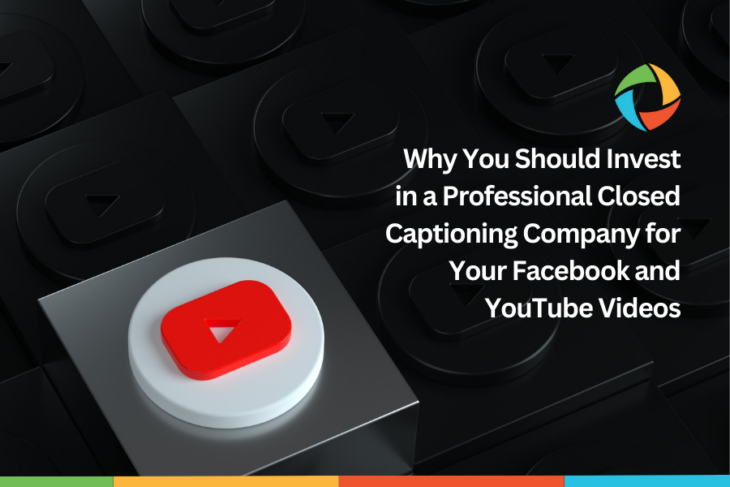
Why You Should Invest in a Professional Closed Captioning Company for Your Facebook and YouTube Videos As a business owner or marketer, you know that creating video content for Facebook and YouTube is essential for reaching your target audience. But have you considered the importance of closed captions for these...
CONTINUE READINGApril 14, 2023 By Jake Drown
The Evolution of Captioning: Why Human Nuance Matters for Accessibility
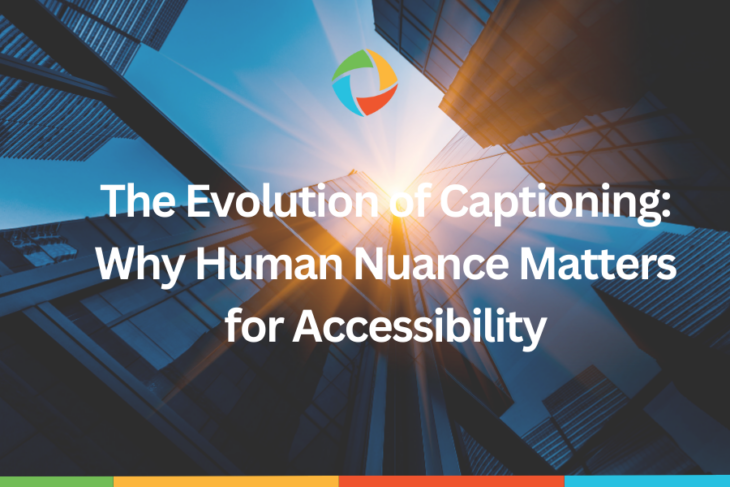
The Evolution of Captioning: Why Human Nuance Matters for Accessibility Captioning has come a long way since its inception. From its humble beginnings as a way to help deaf and hard-of-hearing people connect with television shows, it has now become an indispensable tool for millions of people around the world....
CONTINUE READINGApril 11, 2023 By Jake Drown
The History of Transcriptions in Presidential Speeches

The History of Transcriptions in Presidential Speeches Transcripts have become an essential aspect of video content in today's digital age. They provide accessibility to individuals who are deaf or hard of hearing, as well as those who prefer to read the text of the speech. While transcriptions have become ubiquitous...
CONTINUE READINGApril 10, 2023 By Jake Drown
Boost Your Facebook Ads with Human-Generated Captions

Boost Your Facebook Ads with Human-Generated Captions In today's fast-paced digital world, capturing your audience's attention on Facebook is more challenging than ever. That's why you need to use every tool at your disposal, including captions. In this post, we'll explore how human-generated captions can boost your Facebook ad engagement...
CONTINUE READINGMarch 21, 2023 By Jake Drown
Lost in Translation: The Human Factor in High-Quality Audiovisual Localization
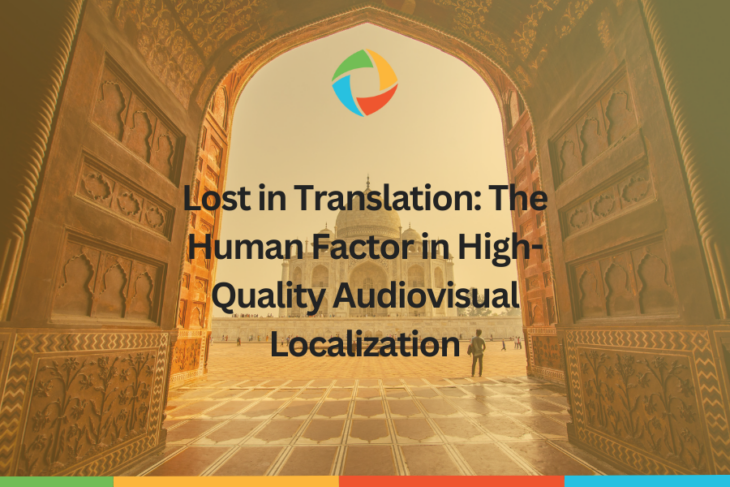
Lost in Translation: The Human Factor in High-Quality Audiovisual Localization Do you remember watching a foreign movie with dubbed audio that didn't match the characters' lip movements or cultural nuances? It can be quite distracting and take away from the overall viewing experience. That's why native language experts are crucial...
CONTINUE READINGMarch 20, 2023 By Jake Drown
Demystifying Closed Captioning: Understanding Key Terms for Business Owners
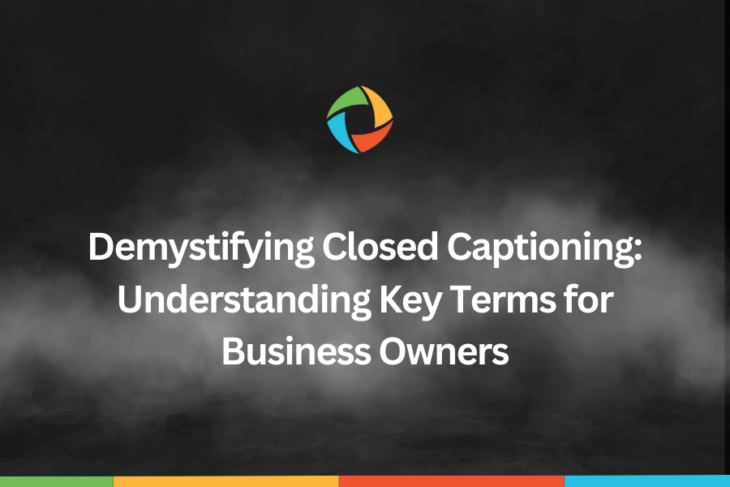
Demystifying Closed Captioning: Understanding Key Terms for Business Owners Are you a business owner looking to improve the quality of your closed captioning services? Do you find that certain words and concepts related to closed captioning can be difficult to understand? Fear not, as we are here to help! In...
CONTINUE READINGMarch 17, 2023 By Jake Drown
Captions: The Future of Special Needs Education

For special needs schools and institutions, providing quality education is essential. However, traditional methods of teaching can fall short when it comes to accommodating different learning styles and abilities. That's where captions come in - they can be a game-changer in creating a more inclusive learning environment. Captions are a...
CONTINUE READINGMarch 16, 2023 By Jake Drown
Why Professional Captioning Services are Essential for Your Movie
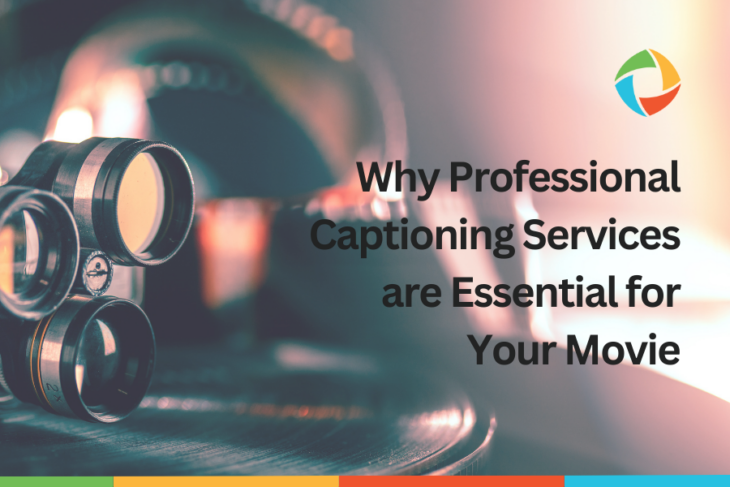
Why Professional Captioning Services are Essential for Your Movie Are you a movie producer looking to create a high-quality movie that resonates with a wide audience? Captions can make a significant impact on the quality of your movie and enhance the viewing experience for all audiences. Professional captioning services can...
CONTINUE READINGMarch 07, 2023 By Jake Drown
Captioning: Context clues or no context clues?
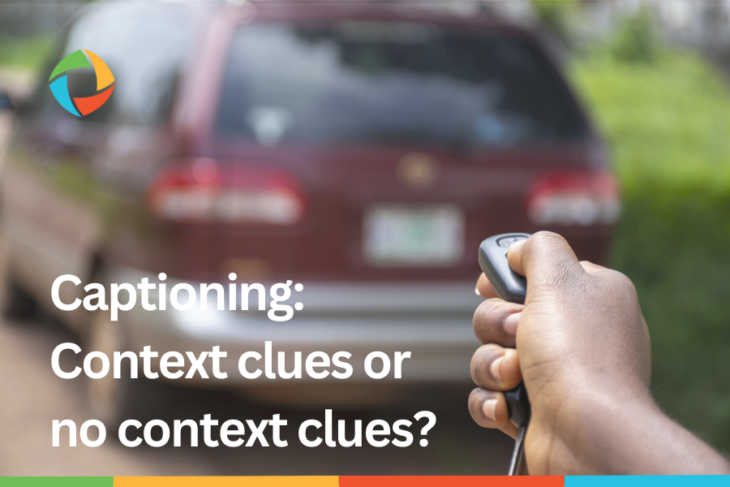
Captioning: Context clues or no context clues? Captioning is a crucial tool that provides accessibility for deaf and hard-of-hearing viewers, as well as non-native speakers and those watching in noisy environments. When creating captions, one important consideration is whether to include context clues or not. In this blog post, we...
CONTINUE READINGMarch 06, 2023 By Jake Drown
The Untapped Market Potential of the Deaf and Hard of Hearing

The Untapped Market Potential of the Deaf and Hard of Hearing Businesses often overlook the market potential of the deaf and hard of hearing, despite the fact that this demographic represents a large and growing consumer base. Here are some key points to consider when tapping into this untapped market...
CONTINUE READINGMarch 01, 2023 By Jake Drown
Closed Captioning for Webinars and Virtual Events: A Must-Have for B2B Marketing

Closed Captioning for Webinars and Virtual Events: A Must-Have for B2B Marketing Webinars and Virtual events have become increasingly popular among businesses, but not all attendees may be able to easily follow the spoken content. One feature that can benefit both attendees and businesses is closed captioning. It is a...
CONTINUE READINGMarch 01, 2023 By Jake Drown
Closed Captioning on TV : The Pioneers

The Pioneers of Closed Captioning on TVClosed captioning on television has come a long way since its early days, and much of its progress is owed to the pioneers who made it all possible. These innovators worked tirelessly to develop the technology and standards that made closed captioning a reality,...
CONTINUE READINGFebruary 22, 2023 By Jake Drown
Improving Language Learning and Comprehension with Closed Captioning

For non-native speakers of a language, learning and comprehending spoken content can be a daunting challenge. Closed captioning learning can help ease this process by providing written text alongside spoken words for better understanding. While traditional language learning methods, such as classes and textbooks, can be helpful, they may not...
CONTINUE READINGFebruary 21, 2023 By Jake Drown
Choosing the wrong captioning company can hurt your ministry – here’s what to look for
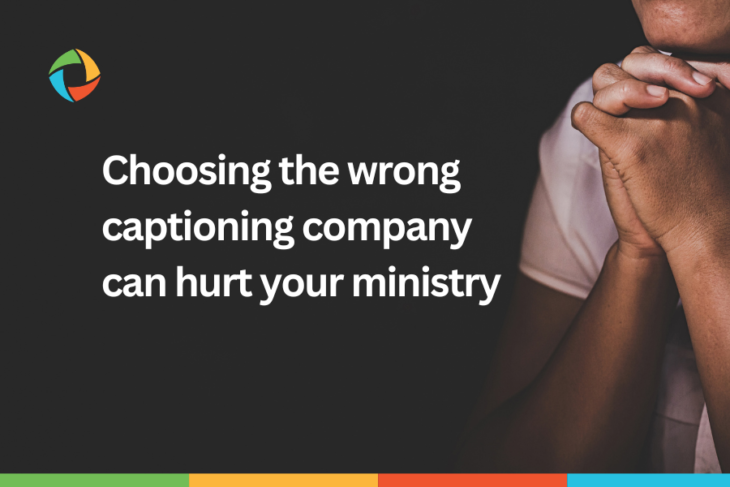
Choosing the wrong captioning company can hurt your ministry - here's what to look for Choosing the right captioning company is crucial for closed captioning your church or ministry's video content. It makes content accessible to all members of your congregation and FCC compliant. Many ministries make critical mistakes when...
CONTINUE READINGFebruary 20, 2023 By Jake Drown
The Sound of Silence: Why Accessible Communication is a Human Right
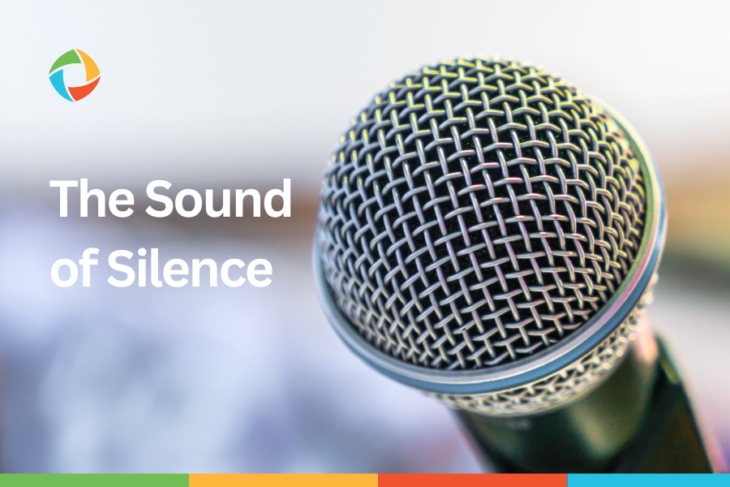
The Sound of Silence: Why Accessible Communication is a Human Right Communication is a fundamental aspect of human life, and everyone should have the right to access and participate in it. For people with disabilities, however, this is not always the case. Accessible communication is a human right that is...
CONTINUE READINGFebruary 17, 2023 By Jake Drown
The Debate of Human-Generated vs AI-Generated Captions: Which is Right for You?

The Debate of Human-Generated vs AI-Generated Captions: Which is Right for You? Captioning is an essential part of digital media, providing an accessible and engaging experience for viewers. When it comes to captioning options, there are two primary choices: Human-Generated vs AI-Generated Captions. In this article, we'll explore the differences...
CONTINUE READINGFebruary 16, 2023 By Jake Drown
Inclusivity in the Church: Catering to Special Needs Individuals
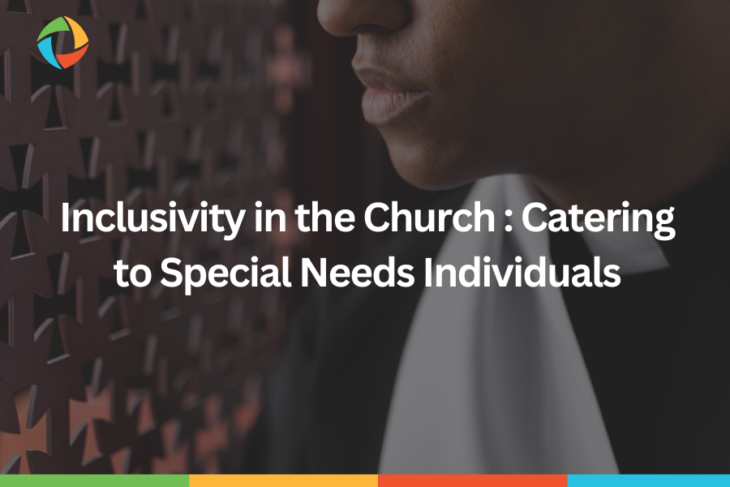
Churches have a responsibility to create welcoming and inclusive environments for all members of their communities. This includes those with special needs, who often face unique challenges when it comes to participating in religious activities. Inclusivity in the church is not only a matter of compassion, but also of social...
CONTINUE READINGFebruary 09, 2023 By Jake Drown
5 Issues with Closed Captioning Your Own Videos

Close captioning is a great way to make videos more accessible to viewers who are hard of hearing or deaf. Unfortunately, it can often be tricky to implement with your own videos, and there are plenty of issues that you may encounter. This article will discuss 5 of the most common issues associated with close captioning your own videos, so you can be better prepared for the task.
Issue 1: Finding the Time to Do It
Close captioning is a very time-consuming process and it is often difficult to find time to do it in your own schedule. Not only does it take time to actually add the captions, but you also have to watch the video while creating the captions, which can take significantly longer than the actual captioning. It’s a good idea to break the video down into smaller parts, so you can work on it in more manageable chunks, but it still takes a lot of time to get the job done.
CONTINUE READINGJuly 17, 2019 By David Appelt
The Power of Video Content on Social Media

The Streaming Revolution has made it possible, among other things, for the average person to spend roughly 38 hours per week watching video content (40% of which is streamed, often on mobile devices). Forty-four percent of people watch more than 5 videos per day (Source: Deloitte). Almost half of the...
CONTINUE READINGApril 24, 2019 By David Appelt
The Universality of Digital Video and the Need for Closed Captions
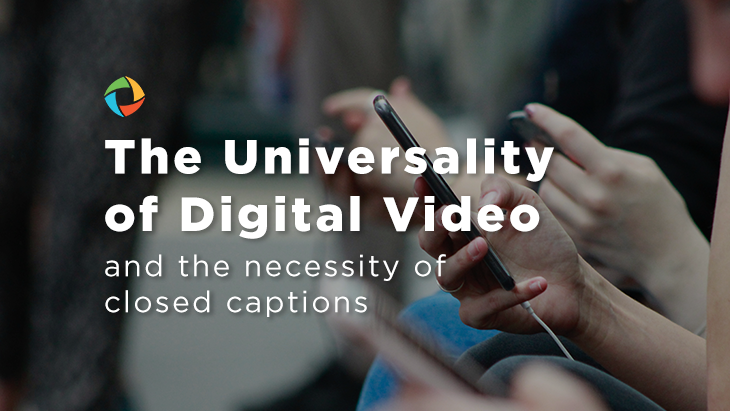
The world where your content is competing is a world where closed captions and subtitles are necessary, if not more necessary than ever—according to multiple digital media usage studies.
CONTINUE READINGApril 27, 2017 By Ben Kalb
The FCC Cracks Down on Quality Standards
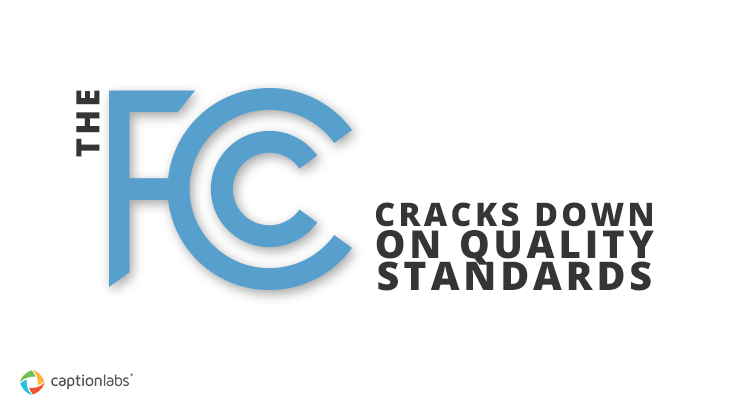
Discount companies are using shortcuts and claim high accuracy at low costs, which sounds pretty good, right? But the FCC isn’t looking for “pretty good”—it’s mandating perfection.
CONTINUE READINGJanuary 07, 2016 By Robin Walters
Attention Marketing: Closed Captioning Increases SEO

There’s been some debate lately about whether search engine optimization (SEO) is dead. It’s true that millennials are splitting their searches between the traditional Google and a host of other topic-specific sites that share consumer ratings of products and services. These days, millennials want to know what their friends think about a service before buying.
CONTINUE READINGOctober 23, 2015 By Jake Drown
The Dangers of Poorly Captioned Broadcasts
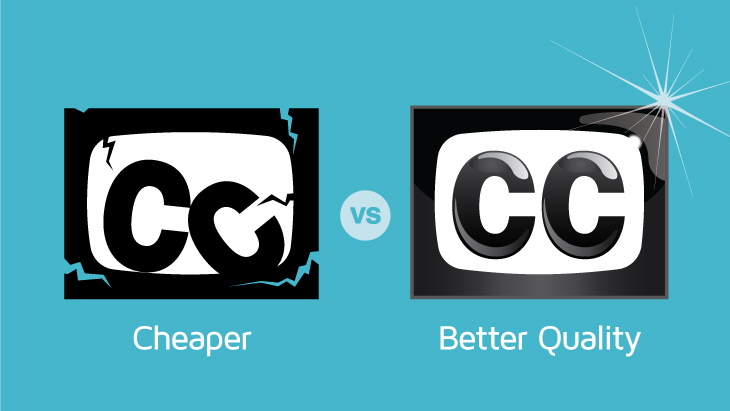
The FCC averages around 500 closed captioning quality complaints per year. Imagine the level of frustration felt by the hearing impaired person that actually takes the time to register a complaint.
When you consider that the majority of Americans can’t seem to find the time to vote – the fact that someone would take the time to complain to a government agency shows the level of angst they must be feeling.
CONTINUE READINGOctober 08, 2015 By Ryan Hawthorne
Fishers of Men: The Importance of Quality Closed Captioning in Ministry Broadcasts

A pure gold brick wrapped in an ugly package.
If you’re a ministry organization, and you’re settling for poor quality closed captioning, that’s exactly what you’re offering to deaf and hard of hearing parishioners.
CONTINUE READINGOctober 07, 2015 By Ben Kalb
Reaching Your Target Audience – Why Closed Captioning is Important

The accuracy of closed captioning is important. It affects nearly 40 million Americans who are hard of hearing or functionally deaf.
Next time you’re at the gym watching the TV scroll closed captioning, notice how many times “there” should be “their.” What about homophones like carat, caret and carrot? We’ve all seen the viral videos of closed captioning gone wrong, but if you’re deaf or hard of hearing, it’s not very amusing at all.
CONTINUE READINGJanuary 18, 2017 By Derek Nicol
The First Deaf Hero in Closed Captioning History

If closed captioning could salute its pioneer, Emerson Romero would be the man. He was a Charlie Chaplain impersonator, an actor for silent movies, and the first to champion accessible media. The best part—he was deaf.
CONTINUE READINGJanuary 18, 2017 By Ryan Hawthorne
FCC Captioning Quality Improvements
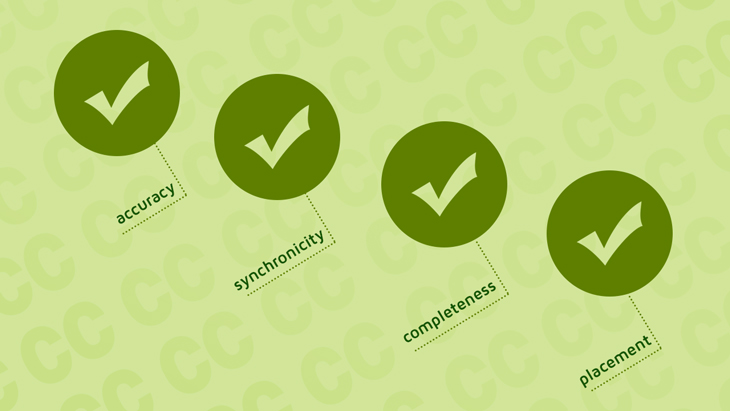
The FCC unanimously voted to adopt new standards for closed captioning on television programming. The new rules are meant to ensure the best efforts of video programming distributors to improve closed captioning quality. The new standards focus on quality improvement to post-produced closed captioning in four specific areas: accuracy, synchronicity, completeness and placement.
CONTINUE READINGJanuary 18, 2017 By Ben Kalb
Tapeless Broadcast: Introducing StationDrop for Seamless Captioning and DeliveryTapeless Broadcast

CaptionLabs proudly introduces the addition of StationDrop to its already popular closed captioning services. StationDrop allows producers to deliver full-length broadcast programming to stations and networks digitally with no hassle, no tapes and no shipping.
CONTINUE READINGJanuary 18, 2017 By Ryan Hawthorne
Transcription: Man vs. Machine in Closed Captioning Transcription

One of the most common questions asked about the closed captioning process centers around transcription. Many people inquire about whether transcription is an automated process using voice recognition, or if it is still truly a function done best by humans.
CONTINUE READINGJanuary 18, 2017 By Ben Kalb
YouTube Introduces New Caption Features
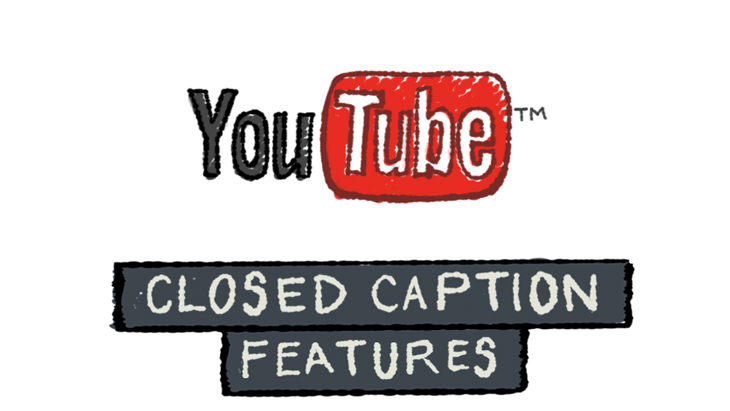
Recent YouTube improvements have made watching online videos with captions better than ever. Since YouTube’s introduction of caption support in 2006, the social media site has been a trendsetter for online accessibility.
CONTINUE READINGJanuary 18, 2017 By Ben Kalb
FCC Sets Deadlines For Internet Captioning

Another important milestone to providing accessibility over the Internet has been reached. In October 2010, President Obama signed the 21st Century Communications and Video Accessibility Act (CVAA) into law. Among the things it required was closed captioning for video programming delivered over the Internet.
CONTINUE READINGJanuary 18, 2017 By Ryan Hawthorne
Premiere Pro Makes Adding Captions Easy

Many editors and producers often wonder how to add closed captioning to their video projects. Fortunately, this process is becoming easier and easier due to great improvements in editing software.
CONTINUE READINGJanuary 18, 2017 By Ben Kalb
Adding Captions in DVD Studio Pro for Accessibility
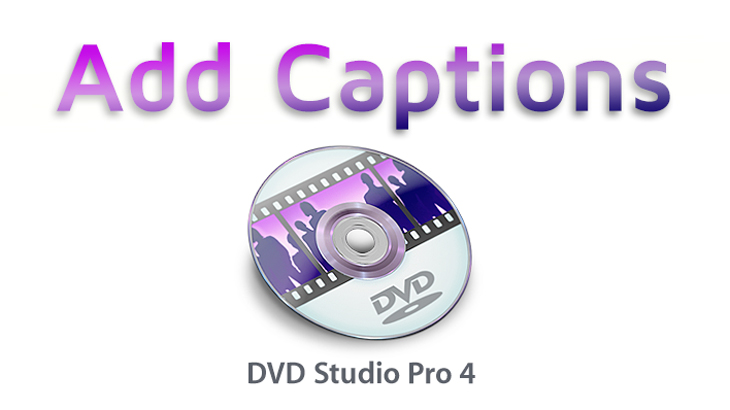
Many people are aware that a DVD can contain subtitles, but few realize that closed captions can also be included. In fact, authoring a DVD with captions may seem like a daunting task, but it is actually a much easier process than you might think.
CONTINUE READINGJanuary 18, 2017 By Ryan Hawthorne
Live Event Captioning

The conversation surrounding closed captions has traditionally focused on the television set and, more recently, even around Internet based video services. What is often overlooked, though, is the great need for accessibility at live entertainment events.
CONTINUE READINGJanuary 18, 2017 By Ben Kalb
Closed Captioning vs Subtitles: Understanding the Difference and Their Role

Almost everyone has used captions at one time or another, whether they are hearing impaired or not. Think about it – how many times have you read captions in a restaurant or at the gym? Closed captions are used everywhere.
CONTINUE READINGJanuary 18, 2017 By Ben Kalb
New Closed Captioned Complaint Rules and Addressing Closed Captioning Issues

Closed captions link whole segments of the population to the world, and that link is about to get stronger.
CONTINUE READINGJanuary 18, 2017 By Ben Kalb
Ask Your Tax Man: How to Claim a Tax Credit for Closed Captioning

It’s been said that “only two things are certain in life — death and taxes”. Although this is a funny little saying, it also seems very true, doesn’t it? Well, here’s a little tip that may save your small business some money. If you have closed captioned programming, you may be eligible to receive a tax credit for providing accessibility to persons with disabilities. It’s called the Disabled Access Credit and is reported on IRS form 8826.
CONTINUE READINGJanuary 18, 2017 By Ben Kalb
Who Is Required To Close-Caption?

With only a few exceptions, all programming for broadcast in the United States must be closed captioned. The rules for the requirement of closed captions were directed by the U.S. Congress in the Telecommunications Act of 1996 and became effective starting in 1998. Since then, the required amount of captioning has been steadily increasing. Today, nearly 100% of all English and Spanish language programming is closed captioned.
CONTINUE READING




















































